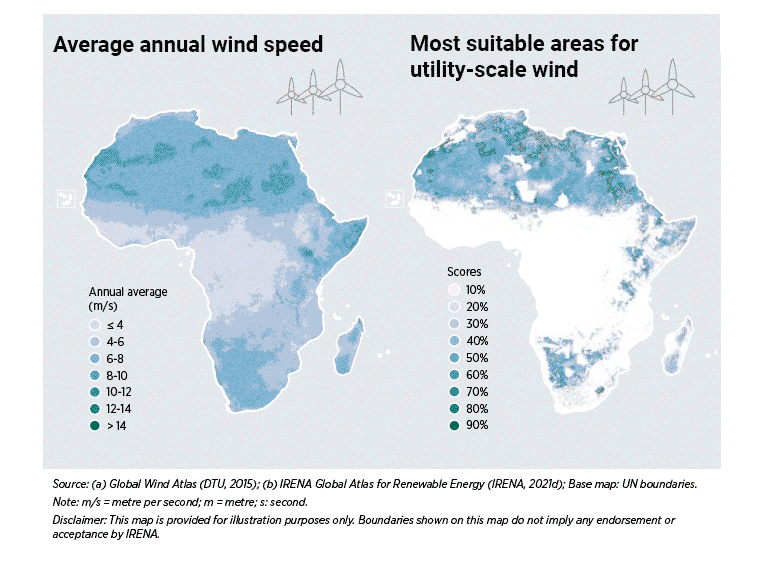An African Green Deal to Deliver a Prosperous Future
Accelerated by a Uniquely African Green Policy Package
A comprehensive policy package towards an ‘African Green Deal’ could create the policy space to unlock billions in energy transition investment and initiate a step-change in the speed of renewables development on the continent. Such a package would require each country to play to its strengths, but it would create new areas of cross-border cooperation, unify strategic objectives and promote knowledge sharing opportunities that deliver against common interests.
Such a deal would recognise that public intervention is essential to achieving a just, inclusive, and people-centric energy transition.
Exploiting Vast Regional Resource Potential
Africa is endowed with significant energy resources. It’s estimated renewable energy potential is 1,000 times larger than its projected demand for electricity in 2040, which means the continent has more than enough renewable energy potential to serve its future demand.
Southern and Eastern Africa’s combined total share of electricity generation from renewables could grow from 20% in 2016 to 63% by 2040. Resource wealth positions the entire continent well to benefit from the energy transition.

Moving Beyond Fossil Fuel Reliance
More than half of Africa’s primary energy supply comes from fossil fuels, which also represent around 40% of African exports. Countries such as Algeria, Angola, Chad, Nigeria and the Sudan are highly dependent on oil and gas as a source of revenue. The emerging low-carbon future will lead to risks of stranded assets, in addition to the already serious effects of price volatility for internationally traded commodities.
Renewables, by contrast, offer African economies prospects for economic growth, cost-effective technologies to expand energy access and quality of access, and industrial development along new value chains, with substantial, local job creation potential.
Increase Energy Access for Socio-economic Development
A key aspiration of the African Union’s Agenda 2063 is “to eradicate poverty in one generation and build shared prosperity through social and economic transformation of the continent”. Yet due to population growth more people live without electricity and clean cooking today than in 2010, despite important advances in some countries.
Without reliable, affordable and sustainable modern energy the continent’s socio-economic development objectives will be impossible to attain. Distributed renewables continue to play a key role in delivering modern energy access ensuring positive socio-economic and welfare outcomes from the energy transition.
Create Millions of Jobs Across Africa
Investing in energy transition technologies creates up to three times as many jobs as fossil fuels per million dollars spent globally. In Africa, the transition creates vast employment opportunities.
Under IRENA’s 1.5° energy transition scenario, Africa would create 26 million more jobs economy-wide by 2050 than under a business-as-usual approach, significantly outweighing fossil fuel job losses in the industry. Renewables jobs alone would top 8.1 million by that time, and all energy transition-related fields would employ close to 17 million people.
Drive Industrialisation and Promote Structural Independence
Africa is well endowed with many of the minerals that are essential inputs for renewable energy and low-carbon technologies like electric batteries and wind turbines, including manganese, copper, lithium, cobalt, chromium and platinum.
Growth in the market for these essential energy transition components holds great potential to benefit African producers if economic activity can move from raw material exports to high value production. This would reduce commodity dependencies and vulnerability to volatile commodity prices. For regional economies based largely on agriculture it would also enhance resilience to climate change impacts.
Fuel Sustained Economic Expansion
Sustainable, clean energy development is a catalyst for broad-based social and economic development in Africa. While just 2% of global energy transition investment went to Africa in the two decades to 2020, a coordinated and integrated approach would increase investment flows and boost GDP. Under a 1.5oC pathway, GDP is 7.5% higher than under current plans in the decade to 2030, and in the decades to 2050 would average out to a 6.4% gain.
While Building Climate and Economic Resilience
Continuing to meet Africa’s growing and diverse energy needs through fossil fuels presents challenges in terms of accessibility, affordability, resilience to supply and price shocks, and environmental protection.
Distributed renewable energy solutions can play a central role as a tailored and resilient source of energy to strengthen rural livelihoods in agriculture and other productive sectors, and deliver public services like healthcare and education.
Boosting All Dimensions of Welfare
The energy transition also has huge potential to improve welfare in Africa, as quantified in IRENA’s multidimensional Welfare Index. Although the relative contribution of the various dimensions differs across African regions, all will see welfare gains. Gains are mostly due to improvements in air quality and thus in human health.
A Policy Framework for Energy Transition
A holistic framework is needed, built on recognition of the close interactions between the energy system, economy and society at large, and planetary ecosystems.
Direct deployment policies must go hand-in-hand with enabling policies and plans to integrate renewables into the energy system, economy and the planet. These efforts also need to be paired with a set of structural policies to strengthen African countries’ industrial capacities; develop its local and regional value chains; address existing commodity and trade dependencies; and pursue education and skill building strategies to forge a skilled workforce.
Explore more on this topic
Browse these Related publications:
